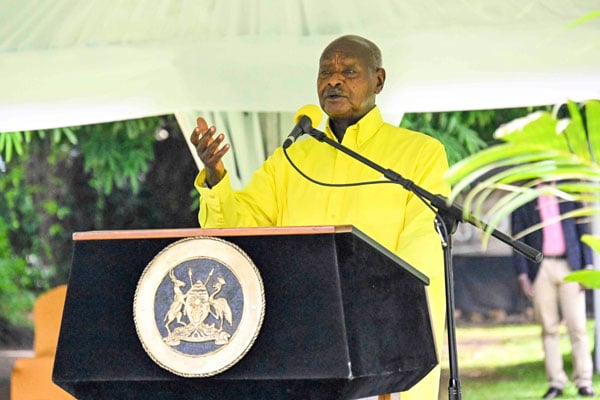Prime
Museveni: Who allows moneylenders to charge 20% interest in Uganda?

President Museveni. PHOTO/ PPU
What you need to know:
- This is not the first time President Museveni is lamenting about exorbitant monthly charges on loans acquired by Ugandans.
President Museveni said Thursday that he had directed the Minister for finance to put out a statutory instrument within two weeks on the interest paid to money lenders.
Mr Museveni who has been in power since 1986 when he became president after a five-year guerrilla war wondered why moneylenders in Uganda are charging 20 percent interest on loans per month and “causing suicide to our young people.”
“While chairing the NRM Caucus at Entebbe State House this afternoon (September 28), I directed the Minister for finance to put out a statutory instrument within two weeks on the interest paid to money lenders in accordance with the inflation which the NRM will support. These moneylenders who are causing suicide to our young people, who allows them to operate? Why should someone charge 20% interest on a loan per month? This must stop,” Mr Museveni posted on his X (formerly Twitter) handle.
Mr Museveni’s remarks come amid growing concerns over the rate at which some fraudulent money lenders and microfinance institutions are reportedly hoodwinking unsuspecting Ugandans into borrowing at exorbitant interest rates, with a target of snatching the collateral security of defaulters.
Government says close to 1,500 money lenders have been registered by Uganda Microfinance Regulatory Authority (UMRA).
This is not the first time President Museveni is lamenting about exorbitant monthly charges on loans acquired by Ugandans.
During a retreat at the National Leadership Institute in Kyankwanzi District recently, the president asked the Attorney General to clarify on why there is no law regulating lending rates offered by money lenders.
In July this year, the Speaker of Parliament Anita Among also threatened to terminate all Memorandums of Understanding (MoUs) that various money lenders have with a section of legislators in the 11th Parliament citing high-interest rates.
Ms Among on July 27 said the move was purposely to instill discipline amongst money lenders whom she accused of ‘harassing’ MPs.
“And money lenders who are harassing MPs with very high-interest rates, even if it’s just one day overdue, I am going to cancel those MoUs because the easiest way to get their money is from Parliament,” she said.
According to Bank of Uganda, lending rates have averaged 21 percent since the early 1990s. The primary driver of the rates is the substantial overhead expenditures faced by financial institutions.
To counter these costs, higher interest rates become a necessity for lenders, experts have argued.




